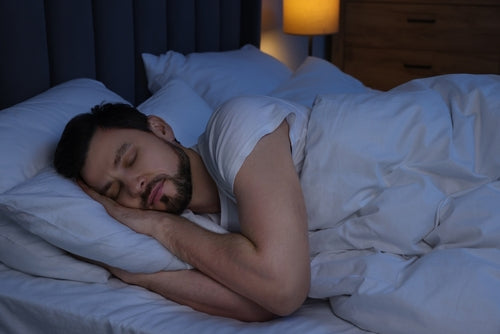Sleep is as essential for your health as a nutritious diet and regular exercise. Studies have shown that poor sleep can negatively affect your cognitive ability, mood, immune system, heart health, body weight, and much more. Taking steps to get enough quality sleep is one of the most important things you can do for your health. Here are 6 ways to get a better night’s sleep so you can optimize your health:
1. Pay Attention to What You Eat and Drink

If you want to get a better night’s sleep, avoid eating heavy or large meals within a couple hours of bedtime. Going to bed stuffed or hungry can lead to discomfort that may keep you awake. Caffeine, nicotine, and other stimulants can make it difficult to fall and stay asleep, so you should stop consuming them at least 8 hours before bedtime. Alcohol, on the other hand, may make you feel sleepy; however, it can disrupt your sleep later in the night. It’s best to avoid drinking alcohol close to bedtime.
2. Keep Your Bedroom Cool and Dark
A great way to get a better night’s sleep is to optimize your bedroom environment. Try to minimize noise and lights from both outside and devices like alarm clocks. Noise and light can interfere with your ability to sleep. Make sure you also keep the temperature of your bedroom comfortable. For most people, this is around 65 degrees, but your preferences may differ. It may be a good idea to improve the air quality of your bedroom as well with proper ventilation and an air purifier.
3. Turn Off Screens Before Bed

The screens of electronic devices such as smartphones, computers, and TVs give off large amounts of blue light. Exposure to blue light at night can reduce levels of melatonin, which helps you relax and achieve deep sleep. Avoid screen time for 2 hours before bed to reduce your exposure to blue light. If you need to use a device close to bedtime, try wearing glasses that block blue light to limit its effects on your quality of sleep.
4. Stick to a Regular Sleep Schedule
Try to go to sleep and wake up at consistent times each day, including weekends. Sticking to a regular sleep schedule can help you get a better night’s sleep in the long run. This reinforces your body’s circadian rhythm and makes it used to going to sleep at a certain time every day. If you don’t fall asleep within about 20 minutes of going to bed, get up and do something relaxing like reading or listening to calming music. Then go back to bed when you’re tired. This keeps your body from getting used to lying in bed without sleeping.
5. Seek Natural Light Throughout the Day

If you want to get a better night’s sleep, try increasing your exposure to natural light during the day. This keeps your circadian rhythm in sync, which can both boost your energy during the day and support quality sleep at night. A study performed in 2022 found that daytime bright light exposure may improve both quality and duration of sleep. When you wake up, open the curtains or step outside to start your day with sunlight. This signals to your body’s internal clock that it’s now waking hours and synchronizes it so you’ll be ready to sleep at bedtime.
6. Try Supplements
If you need some extra help getting a better night’s sleep, taking certain supplements may be beneficial. Magnesium Glycinate contains magnesium and glycine, and this combination is known for its potential to contribute to better sleep. This supplement has a calming effect on the nervous system and may help you fall asleep faster and have more restful sleep. Another great supplement for sleep is Inositol. This is a sugar naturally found in the body that may impact circadian rhythms to help regulate sleep and improve sleep quality. For an all-in-one sleep supplement, you can try MaxRelax. This powdered drink mix contains magnesium, myo-inositol, taurine, GABA, and L-theanine to promote a calm, relaxed, and balanced emotional and physiological state that supports sleep.
If you have any questions about taking supplements for sleep or want to learn more tips for improving your quality of sleep, please reach out to us at Kizer Pharmacy. Our expert pharmacists will be happy to answer your questions and provide recommendations to help you get the sleep you need.


